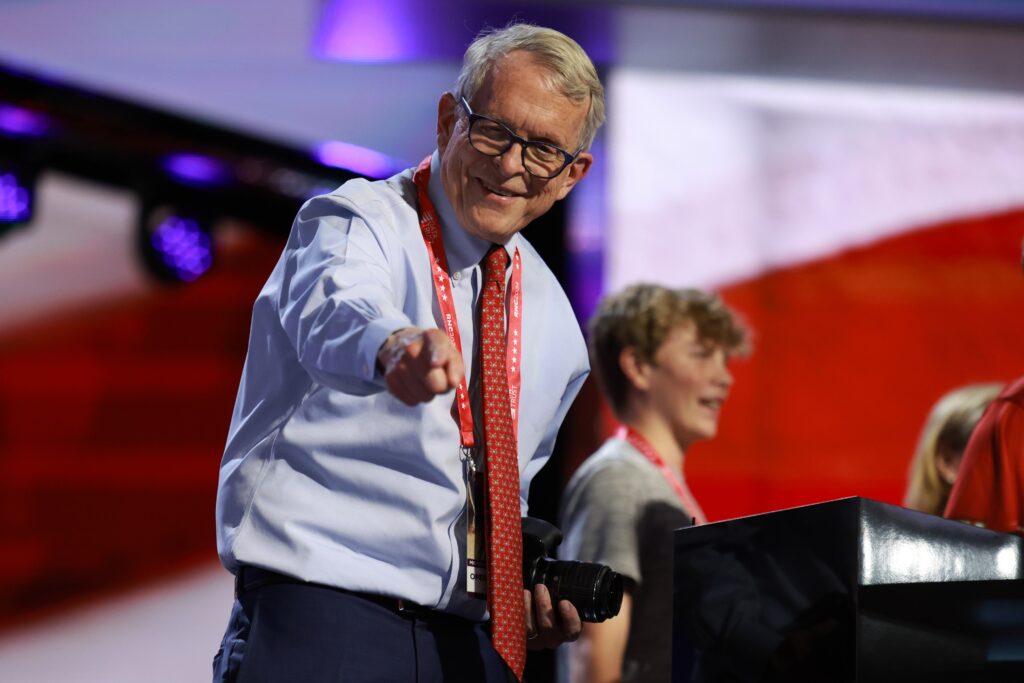COLUMBUS, Ohio — The month they are born, all Ohio children can be enrolled in a program that sends a book (“The Little Engine That Could”) addressed to them personally. This introduction to an indispensable ingredient of success and happiness — reading — is a public-private collaboration with Dolly Parton’s Imagination Library, embraced by Gov. Mike DeWine and some other governors. The 400,000 children currently in the program will receive 59 more books, one a month, until at age 5 they receive “Look Out Kindergarten, Here I Come!”
In 15 of the poorest Ohio counties, where health care can be distant, a DeWine program sends to schools a bus equipped for eye examinations for children. Three weeks later, glasses arrive and some children suddenly see the blackboard clearly.
Such granular-level government, touching people directly, began in 1976 for 29-year-old DeWine when he was elected county prosecutor, 10 presidential administrations ago. Gerald Ford was president. When 33-year-old DeWine won a state Senate seat in 1980, Democrat Jimmy Carter was president, having carried Texas while defeating Republican Ford, who won Illinois. The past really is another country.
Ohio was, and for a generation remained, a swing state and bellwether. In 28 of 30 presidential elections, 1896 through 2012, it favored the winner. Today it is bright red, having been carried three times by Donald Trump.
DeWine, whose father had a seed business nearby, grew up in Yellow Springs, a small, hyper-progressive college town (Antioch) — the Paris Commune of the Midwest. He began, as he remains, a conservative Republican. At age 14 in 1961, he named his puppy Barry to honor Arizona Sen. Barry Goldwater, the GOP’s 1964 presidential nominee who blazed Ronald Reagan’s trail.
Donald Trump, DeWine says, has been an accelerant, not an ignitor, of the rightward drift of working-class Ohioans, which began two decades before Trump entered politics. Ohio was an early cauldron of U.S. industry: Standard Oil created by Cleveland’s John D. Rockefeller; tires from Akron (Firestone, Goodrich, Goodyear); steel mills in Ohio’s north, consumer goods in the south (Cincinnati’s Procter & Gamble, Kroger groceries). But people and capital are mobile, and DeWine says his primary task today is “bringing in people.” He lately has been reassuring Cleveland’s Sherwin-Williams, the paint people, that the state will produce sufficient chemistry and other PhDs.
DeWine does not speak ill of today’s president. Some unspoken inferences are, however, unavoidable. Nationally, there are more than 400,000 unfilled manufacturing jobs, while ICE warriors, dressed for combat on Iwo Jima, swarm U.S. communities, deporting workers.
Education is the health of any state, so DeWine has emulated Mississippi’s success with “science of reading” instruction. He made himself the villain by doing what many local officials flinched from: banning smartphones in schools, where suddenly screen-deprived students began talking together during lunch. Every Ohioan is eligible for some state school-choice aid. DeWine, too, has noticed that some poor counties have high-performing schools because they have high percentages of intact families: for example, Ohio’s Amish.
After serving as Ohio’s lieutenant governor, four terms in the U.S. House, two terms in the U.S. Senate, two terms as Ohio’s attorney general, and now a second term (he is term-limited) as governor, DeWine and his wife, Frances — they met in first grade — will soon retire. They might, however, continue hosting ice cream socials because they have Midwestern DNA.
In his congressional years, he and Frances liked living in suburban Washington with Republican and Democratic legislators as neighbors, before neighborliness became politically risky. The DeWines missed 4-H and Little League, so they returned to a changing Ohio.
In the past 30 years, its cities have become bluer, and small towns and rural counties have become redder, which DeWine does not ascribe primarily to economics — deindustrialization. Much of that occurred in the 1970s and 1980s “without,” he says, “changes in voting patterns.”
“We have sorted ourselves out politically,” he says, because “the culture of Democrats became offensive.” House Speaker Tip O’Neill, who died in 1994, was inoffensive, but blue-collar Democrats “can’t relate to those they see on TV now.”
Ohio has produced, loosely speaking, seven presidents, eight if you count, as some Ohio chauvinists do, Ulysses S. Grant, an Ohioan until leaving at age 17 for West Point. But before bracing for that bleak future, savor DeWine’s almost half-century in politics. It has been, unlike today’s politics of schoolyard snark and empty gestures (see: today’s vice president), a dignified political vocation.
The post Amid today’s unpalatable politics, here’s a public career worth savoring appeared first on Washington Post.




